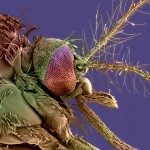Lien vers Pubmed [PMID] – 28662031
PLoS Negl Trop Dis 2017 Jun;11(6):e0005698
BACKGROUND: Chikungunya virus (CHIKV) has dispersed in the Americas since 2013, and its range of distribution has overlapped large forested areas. Herein, we assess vector competence of two sylvatic Neotropical mosquito species, Haemagogus leucocelaenus and Aedes terrens, to evaluate the risk of CHIKV to initiate a sylvatic cycle in the continent.
METHODOLOGY/PRINCIPAL FINDINGS: Haemagogus leucocelaenus and Ae. terrens from the state of Rio de Janeiro, Brazil were orally challenged with the two CHIKV lineages circulating in the Americas. Fully engorged females were kept in incubators at 28±1°C and 70±10% humidity and examined at 3 and 7 days after virus exposure. Body (thorax plus abdomen), head and saliva samples were analyzed for respectively determining infection, dissemination and transmission. Both Hg. leucocelaenus and Ae. terrens exhibited high infection and dissemination rates with both CHIKV isolates at 7 dpi, demonstrating that they are susceptible to CHIKV, regardless of the lineage. Remarkably, Hg. leucocelaenus expectorated infectious viral particles as rapidly as 3 days after the infectious blood meal, displaying higher values of transmission rate and efficiency than Ae. terrens. Nevertheless, both species were competent to experimentally transmit both CHIKV genotypes, exhibiting vector competence similar to several American Aedes aegypti.
CONCLUSIONS/SIGNIFICANCE: These results point out the high risk for CHIKV to establish a sylvatic transmission cycle in the Americas, which could be a serious health issue as CHIKV would become another zoonotic infection difficult to control in the continent.

